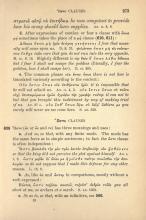639. Ὥστε (ὡς or ὥς and τε) has three meanings and uses
a. And so, so that, with any finite mode. The mode has the same force as in simple sentences; in fact the ὥστε clause is often independent.
Ὥστε βασιλεὺς τὴν μὲν πρὸς ἑαυτὸν ἐπιβουλὴν οὐκ ᾐσθάνετο
so that the king did not perceive the plot against himself
Xen. Anabasis 1.1.8
ὥστε μηδὲν διʼ ἄλλο με ἡγεῖσθε ταύτην ποιεῖσθαι τὴν ἀπολογίᾱν.
So do not suppose that I make this defense for any other reason.
Lysias 16.8
b. As, like ὡς and ὥσπερ in comparisons, mostly without a verb expressed.
Πάντες, ὥστε τοξόται σκοποῦ, τοξεύετʼ ἀνδρὸς τοῦδε.
You all shoot at me, as archers at a mark.
Soph. Antigone 1033
c. So as to, so that, with an infinitive, see § 566.
XML Files

